
Avenues_first certificate_WB
.pdf
 Conditional sentences (revision)
Conditional sentences (revision)
Complete the second sentence so that it has a similar meaning to the first sentence, using the word given. Do not change the word given. You must use between two and five words, including the word given.
1It's impossible for you to paint as well as Picasso, try
However ..hard you try |
you'II |
never |
paint as well as Picasso. |
|
|
2Gaby will go to art school even if her parents don't want her to.
say
Whatever |
, Gaby |
will go to art school. |
|
3Malcolm goes to the Museum of Modern Art as often as possible.
whenever
Malcolm goes to the Museum of Modern Art
free.
4These paintings cannot be exhibited in the restaurant without the manager's permission. provided
The restaurant will exhibit these paintings
her permission.
5What would you say to the news that your old teapot was a valuable antique?
I
Suppose your old
teapot was a valuable antique, what would you say?
6This ancient Egyptian necklace may only be tried on with care.
careful |
|
As |
you may try |
on this ancient Egyptian necklace. |
|
7You should have that stamp collection valued by an expert.
I
If I |
that stamp |
collection valued by an expert. |
|
120
8The archaeologists only found Tutankhamen's tomb because they had a good idea where to look. if
The archaeologists wouldn't have found Tutankhamen's tomb
a good idea where to look.
9These paintings are so expensive only because the artist is dead!
cost
These paintings |
if |
the artist were still alive! |
|
10Did Van Gogh's mental illness enable him to paint such impressive pictures?
he
If Van Gogh hadn't been mentally ill,
such impressive pictures?
11Only daily practice will help Regina play the clarinet better.
unless
Regina won't play the clarinet better
day.
12Our national costume looks old-fashioned, so we don't wear it very often.
if
We'd wear our national costume more often
so old-fashioned. 1 3 Don't miss the opportunity of tasting Brazilian
feijoada.
chance |
|
If you |
Brazilian |
feijoada. |
|
14I'm sorry Jane Austen only wrote a few novels, wish
I more novels.
15 I regret not knowing more about traditional
Chinese medicine. |
|
only |
|
If |
more about |
traditional Chinese medicine. |
|
16Please don't do your violin practice while I'm studying.
wish |
|
I |
your violin |
practice while I'm studying. |
|
U N I T 1 5 C u l t u r e a n d t r a d i t i o n
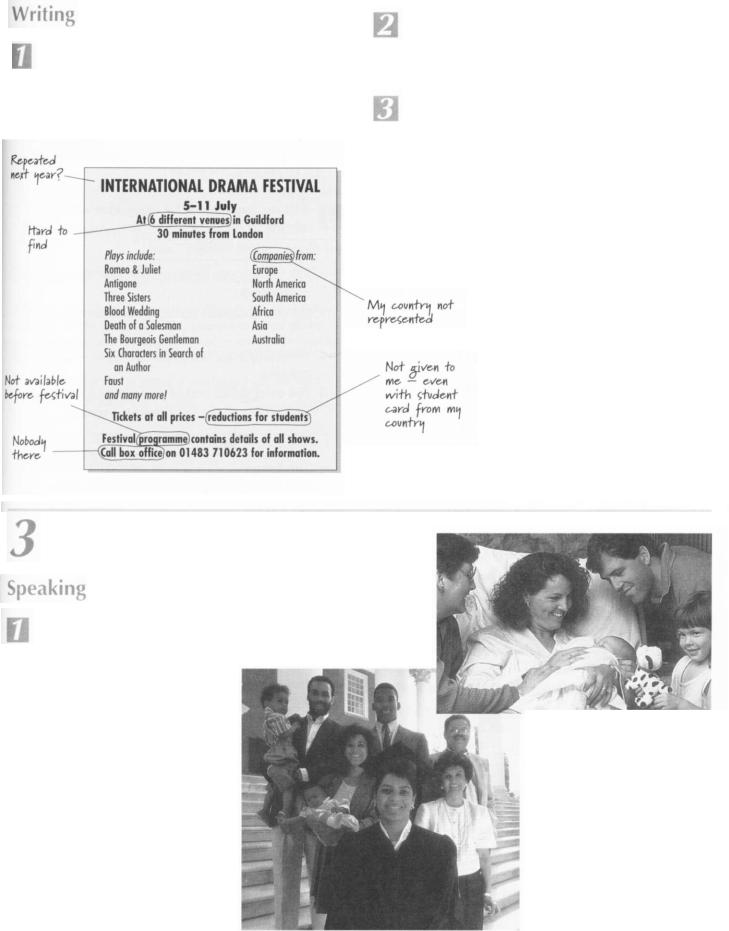
Making a complaint
You recently went to some performances at an international drama festival. You enjoyed the
plays but you thought the festival could have been better organised. Read the advertisement below, together with your notes. What disappointed you about the festival?
Write a letter (120-180 words) to the festival organisers telling them about your feelings.
Remember to do a paragraph plan before you start to write.
After writiny, check that
•you have included all the relevant points.
•you have organised your ideas clearly in paragraphs.
•you have written in an appropriately polite but forceful way which will impress the organisers of the festival.
•you have begun and ended your letter in an appropriate way.
•you haven't made any grammar, spelling or punctuation mistakes.
Family celebrations
Compare and contrast the two photos, saying how you feel about these different types of
family celebration.
Record your ideas on a blank cassette (remembering to keep speaking
for one minute). Listen to them and think how you could improve what you say. Then record everything again.
L E S S O N 2 |
A r t a n d c u l t u r e |
121 |
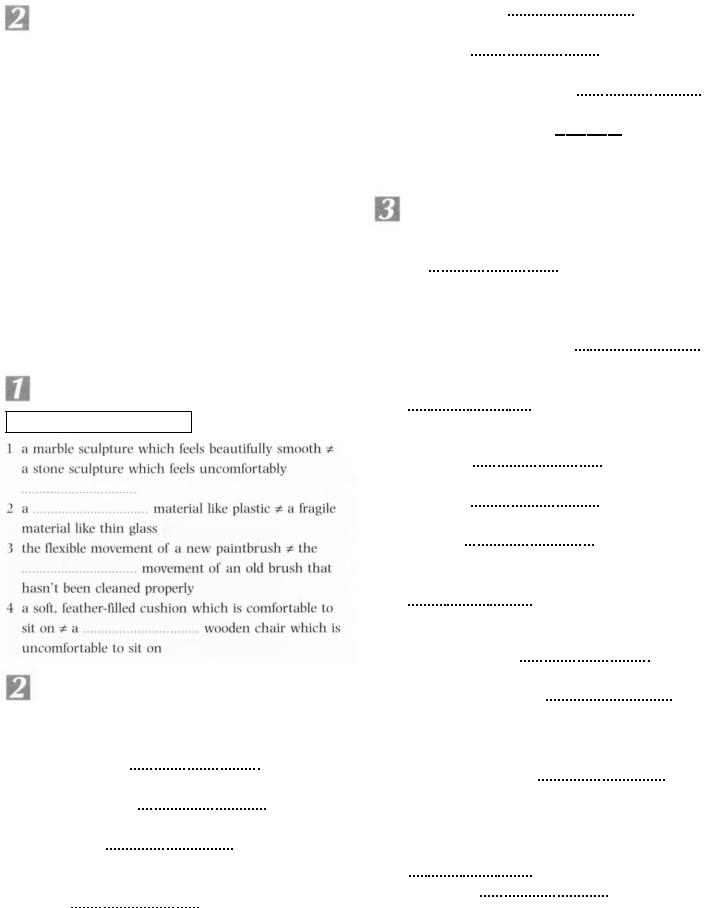
There are many speeial things families ean do for important family celebrations. For example,
they can:
•send invitations
•invite family and close friends only
•invite as many people as they know
•wear new clothes
•provide flowers
•provide food and drink
•play music
•give presents
•send letters or cards
•pay visits
Use some of these ideas to tell a story about a recent important celebration in your family. Record your story, listen to it, then record it again.
If possible, find a classmate to tell your story to. Who has the more unusual story to tell?
 The right word
The right word
Fill the gap in each description of a pair of opposites with the correct word.
hard rough stiff tough
Fill the gaps in 1-H by using each word in the box once only.
constructed |
designed |
drew |
expressed |
|
|
|
represented |
shaped |
sketched |
wrote |
|
|
|
|
|
|
|
1 |
My young brother |
|
pictures |
||
|
before he was able to form letters. |
||||
2 |
The painter quickly |
|
the scene in |
||
|
pencil before returning to her studio to paint it. |
||||
3 |
The composer |
|
and performed his |
||
|
first piano works while he was still at school. |
||||
4 |
In her production of Antony and Cleopatra, the |
||||
|
designer |
|
the palace by a huge |
||
curtain of painted gold.
122
5 Like all dancers, he |
|
|
|
himself |
|||||||||
|
|
better through movement than in words. |
|||||||||||
6 |
The architect |
|
|
|
an interesting |
||||||||
|
exterior staircase for the new block. |
|
|
|
|
||||||||
7 |
For the World Fair the builders |
|
|
|
|
|
a |
||||||
|
|
tower with a revolving garden on top. |
|
|
|
|
|||||||
8 |
|
The sculptor |
|
first |
|
the figure |
|||||||
|
|
roughly in clay before working carefully on the arms |
|||||||||||
|
|
and |
head. |
|
|
|
|
|
|
|
|
|
|
|
|
|
Fill the gaps in a-d by using each word or |
||||||||||
|
|
|
phrase in the box once only. |
|
|
|
|
||||||
|
|
|
|
|
|
|
|
|
|
|
|
||
1 |
|
|
figure form |
shape |
size |
|
|
|
|
|
|
||
|
|
|
|
|
|
|
|
|
|
|
|||
|
|
a |
The |
|
|
of the painting is 2 |
|||||||
|
|
|
metres by 3. |
|
|
|
|
|
|
|
|||
|
|
b |
His new sculpture is roughly rectangular in |
||||||||||
|
|
c |
Watercolour is my favourite |
|
|
|
|
|
of |
||||
|
|
|
painting. |
|
|
|
|
|
|
|
|
|
|
|
|
d |
The most skilful part of this drawing is the |
||||||||||
|
|
|
|
|
|
|
of the seated woman. |
||||||
|
|
|
|
|
|
|
|
|
|
|
|||
2 |
|
|
applauded |
|
boasted |
congratulated |
praised |
|
|||||
|
|
|
|
|
|
|
|
|
|
|
|||
|
|
a |
The Sultan |
|
|
|
Shahrazad for her |
||||||
|
|
|
skill in keeping him interested in her stories, |
||||||||||
|
|
b |
His friends |
|
|
|
him on passing all |
||||||
|
|
|
the tests the King set him. |
|
|
|
|
|
|
||||
|
|
c |
The giant |
|
|
|
that he was |
||||||
|
|
|
stronger than any of his rivals, |
|
|
|
|
||||||
|
|
d |
At the end of the performance the audience |
||||||||||
|
|
|
|
|
|
|
loudly. |
|
|
|
|
|
|
|
|
|
|
|
|
|
|
|
|||||
3 |
|
|
appeared |
assisted |
attended |
were present |
|
|
|||||
|
|
|
|
|
|
|
|
|
|
||||
|
|
a |
All the guests who |
|
|
|
the |
||||||
|
|
|
christening |
brought |
presents. |
|
|
|
|
||||
|
|
b |
All the King's relatives |
|
|
|
at the |
||||||
|
|
|
party, except for one old witch. |
|
|
|
|
||||||
|
|
c |
When Aladdin rubbed the lamp a strange figure |
||||||||||
|
|
d |
The Princess's friends |
|
|
|
her in |
||||||
|
|
|
dressing for her wedding. |
|
|
|
|
|
|
||||
|
|
|
|
|
|
||||||||
4 |
|
|
chance |
fortune luck opportunity |
|
|
|
||||||
|
|
|
|
|
|||||||||
|
|
a |
In many countries it's considered bad |
||||||||||
|
|
|
|
|
|
|
to walk |
under a ladder. |
|||||
|
|
b |
Is there any |
|
|
of your visiting |
|||||||
|
|
|
me in October, during the festival? |
|
|
|
|
||||||
U N I T |
1 5 |
|
C u l t u r e |
a n d |
t r a d i t i o n |
||||||||

|
c |
It will give you the |
|
to take |
||
|
|
some |
interesting |
photographs. |
||
|
d |
I had the good |
|
to arrive in |
||
|
|
Siena the day before the Palio. |
||||
|
|
|
|
|
|
|
5 |
|
deserve |
forgive |
pretend |
regret |
|
|
|
|
|
|
|
|
|
a |
Can you |
|
me for forgetting |
||
|
|
your birthday? |
|
|
|
|
|
b |
I |
|
having told you my secret. |
||
|
c |
She tried to |
|
that she had seen |
||
|
|
nothing. |
|
|
|
|
|
d |
Well done! You |
|
to succeed! |
||
 Revision exercise
Revision exercise
Complete the second sentence so that it has a similar meaning to the first sentence, using the word given. Do not change the word given. You must use between two and five words, including the word given.
1 'Wendy, could you make a birthday cake for me?' asked Rosanne.
asked |
|
Rosanne ..asked Wendy to make |
her a |
birthday cake. |
|
2'If I were you, Harry, I'd go to Hong Kong for Chinese New Year,' said Wang Mei. suggested
Wang Mei |
to Hong |
Kong for Chinese New Year. |
|
3'What's the date of Easter this year?' asked Katrin. when
Katrin asked |
that |
year. |
|
4None of Caroline's cousins had such a big wedding as her.
much
Caroline's wedding
any of her cousins'.
5I have never been as bored as I was at Cindy's Halloween party.
was
Cindy's Halloween party I've ever been to.
6Kevin should be married to some nice girl by now. time
It |
to some nice |
girl.
7Nobody has sent out the wedding invitations yet. still
The wedding invitations out.
8Thousands of television viewers were watching the procession when the electricity went off.
by
The procession
thousands of television viewers when the electricity went off.
9Unfortunately ballet isn't often performed in this city.
wish
I |
more often in |
this city. |
|
10I don't suppose there'll be any tickets for the concert left.
likely
Tickets for the concert sold out.
11It was thanks to her fairy godmother that Cinderella was introduced to the Prince. met
Cinderella |
the |
Prince if |
her fairy godmother hadn't helped her. |
12Going to bed early tonight would be sensible. better
You |
to bed late |
tonight. |
|
131 must buy a new film because I may want to take a lot of photos at the festival.
feel
I must buy a new film in
a lot of photos at the festival.
14Otto's intelligence prevented him from believing Mark's lies.
too |
|
Otto was |
Mark's |
lies. |
|
15If the weather hadn't been so cold, Yannis might have gone out.
such |
|
It was |
Yannis |
stayed |
indoors. |
L E S S O N |
3 |
C e l e b r a t i o n s |
123 |
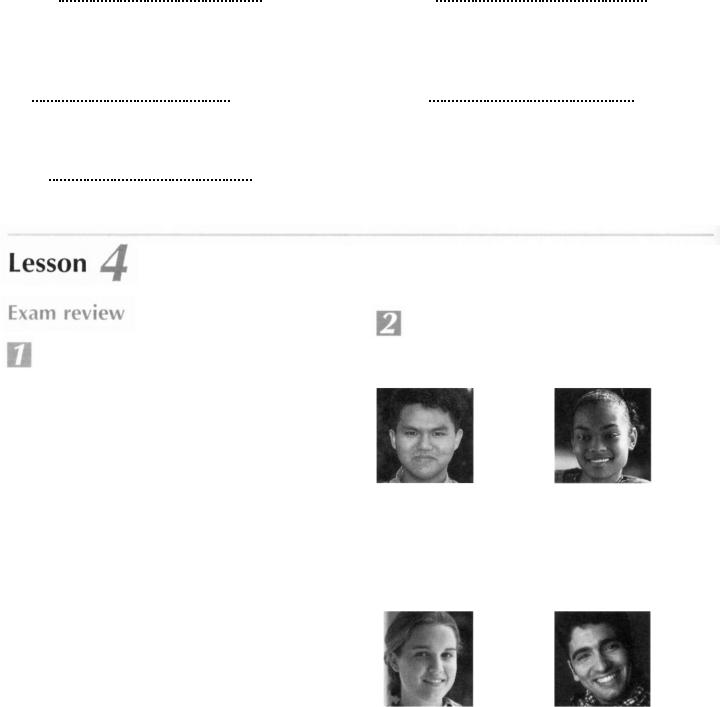
16Alex has got into the habit of swimming in icy water.
used
Alex in icy water.
1 7 Although she looked everywhere, the Princess couldn't find the magic ring.
spite
The Princess couldn't find the magic ring everywhere.
18 Luke was the only guest who didn't bring Magda a birthday present.
except |
|
All |
brought Magda |
a birthday |
present. |
19After the completion of this theatre, an international drama festival will be held here. built
When an
international drama festival will be held here.
20Not many people realise the amount of work that is involved in an opera production.
realise |
|
Only |
much work is |
involved |
in an opera production. |
In Lesson 4 of Coursebook Units 11-75 you have studied how to deal with these exam
questions:
Paper 1 Reading, Parts 1 and 4 (Coursebook pages 1 39-140) Paper 2 Writing, Parts 1 and 2 (Coursebook page 177)
Paper 3, Use of English, Part 5 (word formation) (Coursebook page 152)
Paper 5 Speaking. Parts 3 and 4 (doing a task together, discussion)
(Coursebook pages 164-5)
You have also read information about practical matters to do with taking the exam on Coursebook page 187.
If you don't feel confident about any of these exam questions, read the relevant Coursebook pages again.
Look at what these students said about doing these types of exam question. Which students
do you agree with? What advice could you give Gi-Suk and Sallette?
Gi-Suk
I don't know how I'm going to finish Paper 1 in the exam. I never have time to read everything in Part 4 properly.
Aleksandra
I enjoy finding words with the same root 'beauty', 'beautiful', 'beautifully', 'beautify'. It's like getting four words for the price of one! So, I think the word formation task is fun.
Sallette
In Part 2 of Paper 2, I won't know which topic to choose. Is it a good idea to write two, and let the examiner choose the best one?
Hamid
I'm looking forward to Parts 3 and 4 of Paper 5 in the exam. I enjoy solving problems and it really makes you communicate with your partner, and share your ideas.
724 |
U N I T 1 5 C u l t u r e a n d t r a d i t i o n |

When you have thought about your advice for Gi-Suk and Sallette, look at the advice given at the end of the book. Did you have the same ideas? Do you think it is good advice?
By |
now |
you |
should |
be familiar with all aspects |
of |
the exam. |
For a |
final check, decide if |
|
statements |
1-10 |
below are |
TRUE or FALSE. |
|
TRUE FALSE
1Each of the live papers is worth the same number of marks.
2You have to pass every paper to pass the exam.
3In Papers 1 -4, you can choose whether to write in pen or pencil.
4In Papers 1 and 3 you should spend the same amount of time on each part.
5To do well in Paper 2 it is not important to have original ideas.
6 In Paper 2. the more you write, the better your chances of a good mark.
7You can answer the questions in Paper 3 in any order, as long as you make sure you answer every question
8In Paper 4, you first write your answers on the question paper, and then copy them onto a special answer sheet.
9You can check again your answers for each part of Paper 4 at the end of the paper.
10You have to wear formal clothes for Paper 5.
To see how well you did, look at the end of the book. Read the comments carefully.
L E S S O N |
4 |
E x a m |
r e v i e w |
125 |
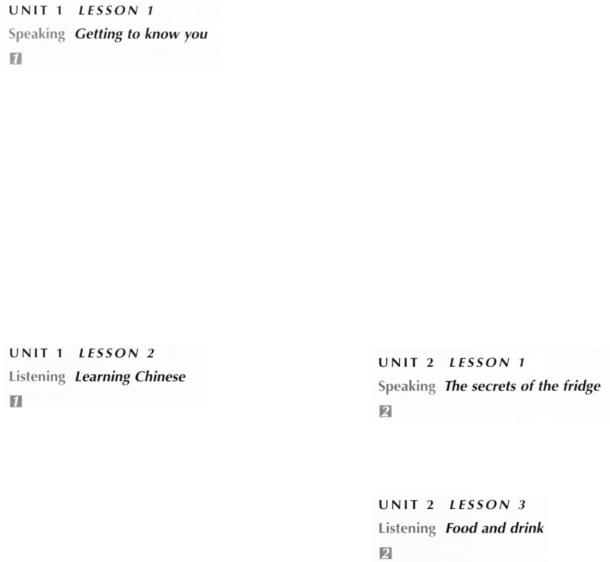
Tapescripts
VOICE:
Can you tell me your name, please?
OK. And where do you come from?
Really? Is it nice there?
And do you live with your family?
I see. How long have you lived at your current address? Uh-huh. Do you go to school, or college, or have you got a job?
Right. And what do you like doing in the evenings and at weekends?
Can you tell me what your plans for the future are?
That's very interesting. And, erm, have you ever been abroad?
Last question. What is important for you in life? Thank you. That was very interesting.
)AVID: You were in China, I understand, and you had to learn Chinese -
SHE: Yes.
>AVID: - which is obviously a very different language from English. Did you have any particular techniques or strategies, that you used which helped you learn the language?
ii'E: Yes. I used to underline vocabulary that I really felt I needed, for my needs, in. I had a. a book, so I'd underline that vocabulary and expression in red so that I could really focus on that.
And trying to maybe, with words, because Chinese is so different from English, thinking Ah, I'll remember that word because it's like this word in English', or making a strong image of the word.
And then the other thing that I really, really, helped me to teach my students better is that you cannot sit down and learn vocabulary, erm, like once a week, sitting down for half an hour with your vocabulary book. But that, in a sense, you have to do it a little bit and often, it's a little bit like doing a diet. If you're on a diet, and you kind of starve yourself and think 'I'll lose weight' and 'I've lost weight",
126
it'll come back on again. Or doing exercises: you need to do it a little and often.
So. the way that I learnt vocabulary, erm, was by copying those words and expressions that I really needed. And also listening to conversations and copying down things that I remembered when I came back.
DAVID: Wh-what do you mean when you say you copied - SHE: I put them -
DAVID: - the words?
SHE: - into my vocabulary book. I found out, in Chinese you have a pinyin, which is like a sort of transliteration system, so it's the Roman alphabet. And. er, I'd sort of notice words that came up again and again, and I'd make a note of them and ask my Chinese friends what they meant, and put them in a special vocabulary book, which I, it was small so I could keep it in my pocket.
And I'd just read my vocabulary book three times a day, just for five minutes.
Erm, and then I'd do what I did last week because you forget terribly quickly. So a little bit and often. I think, is the rule for learning vocabulary. So that it becomes part of your routine and it doesn't become this awful slog of learning lots and lots of words.
VOICE: My fridge is absolutely full of fresh vegetables and different cheeses, because I'm a vegetarian and I don't eat meat. Besides, I adore vegetables, particularly raw ones in crunchy salads!
VOICE 1: I've always loved fish. I was fortunate to be born near the sea and brought up in a home where we regularly ate fresh fish of all kinds. And by 'fresh fish'. I mean really fresh - literally hours from the catch being landed and sorted. My father would march in with a box of whatever had caught his eye - mussels, skate wings, cod, herring, plaice, mackerel and so on. I can still smell them now.
VOICE 2 : For thousands of years, from China to Viking Scandinavia, from the Greeks to the Bible, garlic has been recognised as a top healing plant. Its uses include treating stomach upsets, tackling asthma and other breathing difficulties, relieving colds and coughs, helping headaches,
T a p e s c r i p t s
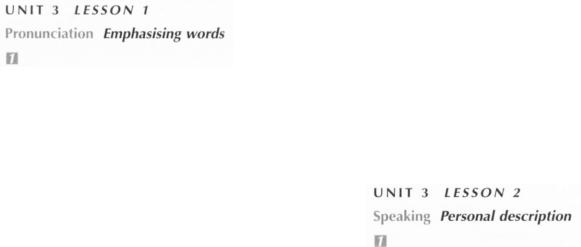
and most of all. strengthening resistance to infection. And every morning I find myself stuck on Clapham
Junction station waiting for a train and 1 go into the buffet and I drink their, their coffee. Sometimes it is really quite good and sometimes it is really pretty awful and they, they get to know me quite well in there because I, 1 make comments on I heir coffee on a daily basis!
VOICE 4: Smells are great memory joggers. One sniff of a lump of salt fish and I'm back in a small dark shop in Oporto: ground spices take me to a chaotic, irresistible market in south-west India: boiled cabbage takes me back to school. My jar of dried orange peel is the heart of
Christmas for me. and this rosewater takes me down a narrow lane in Fez to a wonderful cake shop.
The world's most widely-known style of beer - Pilsner or Pils - originates from the town of Pilsen in Bohemia, in the present-day Czech Republic. In 1842 , Pilsen's local brewery produced the world's first goldencoloured beer, thus 'inventing' pale lager. Until that time all the world's beers had been dark, or at least reddish in colour. It soon became popular throughout the Germanspeaking world, and the rest, as they say, is history.
E X A M P LE
VOICE 1: It's next Saturday.
Is the wedding next week?
VOICE 1: It's next Saturday.
1
VOICE 1: It's at St George's church.
Is the service at St Michael's church? VOICE 1: It's at St George's church.
2
VOICE 1: It's at Sophie's house.
VOICE 2: Where's the party afterwards?
VOICE 1: It's at Sophie's house.
3
VOICE 1: I've been to the dressmaker's.
VOICE 2 : When are you going to the dressmaker's? VOICE 1: I've been to the dressmaker's.
4
VOICE 1: No. she's borrowed a hat.
VOICE 2: Has Rachel bought a hat for the wedding? VOICE 1: No. she's borrowed a hat.
VOICE 1: NO. he has brown hair.
VOICE 2: Does the bridegroom have black hair?
VOICE 1: No, he has brown hair.
2
EXAMPLE
A
VOICE 1: When's the fashion show?
VOICE 2: It's on June the 2nd.
B
VOICE 1: Is the fashion show on July the 2nd?
It's on June the 2nd.
I : Is the fashion show on June the 3rd?
It's on June the 2nd.
l: Julia looks happy. She's got a new coat.
l: I think Julia needs a new coat. She's got a new coat.
I : IS Julia going to wear that awful old coat?
She's got a new coat.
1: Don't forget to take them something. I've got a bottle of champagne.
1: We must buy them a bottle of champagne. I've got a bottle of champagne.
1: Have we got a bottle we can take them? I've got a bottle of champagne.
VOICE l: Where does he work now?
VOICE 2 : He works in Argentina.
B
VOICE 1 : Does he work in Brazil?
VOICE 2 : He works in Argentina.
C
VOICE 1: Is he on holiday in Argentina?
He works in Argentina.
VOICE 1: Hi. My name's Friederike. I'm 2 0 years old and I'm studying at the International College. My favourite subjects are languages, especially English. My hobbies are music, fashion, shopping and chatting with friends. I think I'm an outgoing person, lively and sociable - though people tell me I can sometimes be a bit moody! I'm looking for friends - of either sex - who have similar interests, and I would really like to be able to practise my English conversation with you. If you're interested, do call me and leave a message! My box number is 703 .
VOICE 2 : Hello. I'm Jurgen and I'm 16 years old. I'm a high school student and my favourite subjects are maths and science, especially computer studies. I'm lm 80 tall and I like sports - running, football and baseball, which I'm quite good at because I'm tall. As for my character, I'm friendly, but quiet, quite shy really. I would like to make some new friends, especially if you are interested in the same things as me. Please call me on 709 - that's my box number.
T a p e s c r i p t s |
127 |
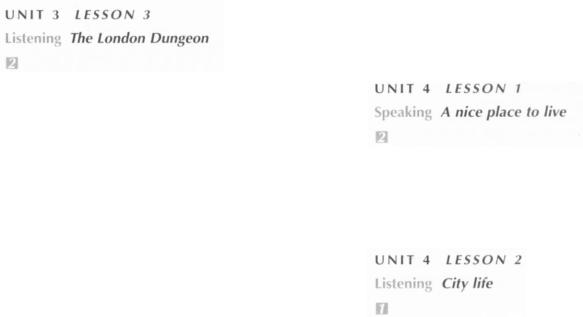
INTERVIEWER: Amy Goodheart is fascinated by villains. Her interest has taken her to a cold dark cellar full of some of the most horrible laces in history. She has been to the London Dungeon. Tell us what you found there, Amy.
AMY: Well, the Dungeon is an exhibition of British medieval history, but actually it concentrates on torture, punishment, disease and death.
INTERVIEWER: SO you saw some pretty major villains there? A M Y : Not specific villains, no. but people who were punished
for crimes, whether they were real or imaginary, people who were tortured because they didn't believe in the right things. So in lots of ways it's not the villains who are there but the victims.
INTERVIEWER: Could you describe some of the punishments these victims suffered then?
AMY: Well, for instance, in those days, if they wanted you to confess to some crime, and you wouldn't, well, they would pile a lot of heavy stones on top of you until you died. So in that case we'd say the villain was the man who was trying to get you to confess, but not the person who was actually suffering the torture. I mean, they could do all sorts of terrible things to you. even though you probably weren't guilty at all. And in the London Dungeon you feel as if you're actually watching those terrible things happening.
INTERVIEWER: How long has it been going? AMY: Since 1 9 7 4 .
INTERVIEWER: And who came up with the idea for such a place?
AMY: Well, it was first thought of by a nice lady who was a London housewife. She had three children, and her name was Annabel Geddes. And she started it because she'd taken her children to the Tower of London, and there were all sorts of notices and descriptions of bloody deeds, but there was no blood at all. and the children were very disappointed. And she thought that, you know, perhaps something actually showing the blood did have a place and would have a certain appeal. So she started this.
INTERVIEWER: H O W did she go about it?
AMY: It was difficult at first because she had no experience; she'd never been in any kind of business at all. Er, so she went and talked to a few of her friends, and her bank. And then she was introduced to a few film set designers: and so it built up gradually.
INTERVIEWER: H O W popular is the museum? How many people visit it every year?
A M Y : Over four hundred thousand.
INTERVIEWER: And why do you think people want to see something like that?
AMY: It's difficult to say. but everybody is sort of fascinated by things that frighten them. And L I think that because everything that's shown happened a long time ago. people can go and look at it. and when they get to the end. they can shrug their shoulders and say, 'But isn't it good that we don't treat anybody like that any more?' I don't know why children are so fascinated, but an awful lot of children go there, and you'd think they would be frightened, but they actually love it.
128
INTERVIEWER: N O W it's in, 1 think, quite an old part of the city really. Erm. are there any real life ghosts there at all?
A M Y : I'm not absolutely sure, and quite honestly I'm not brave enough to stay there at night to find out!
VOICE: I agree that generally it's nicer to live in a cold country than a hot one. The air feels fresher and you can do more things. In a hot country you're sleepy all the time. 1 know that because where I live it gets much too hot in summer. I prefer it in winter because then I can go walking in the hills ...
1
VOICE I : This is the old market square, at the heart of the town. Now, at the corners of the square you can see six streets running off; four of these lead to the old town gates. In the centre, behind me, is the Town Hall, which was the chief administrative centre of the medieval town. In the north-western corner of the square, over there, is the Franciscan church of the Virgin Mary and diagonally opposite, over there, not far from the south-eastern corner, is where St John's parish church once stood.
2
VOICE i: It made such a difference, when I lived in Amsterdam, to be able to just jump on a tram and be at someone's house in ten minutes.
Whereas in London - ?
VOICE, i: It's impossible.
It's much bigger than Amsterdam.
VOICE I : And getting around is such a nightmare.
VOICE 2 : But in Amsterdam the problem is anyone can come and see you at any moment.
VOICE i: Mm. People you don't want to see? Maybe.
VOICE I : In London you have to be more selective in your friends - maintaining friendships takes so much effort.
VOICE 2 : That would suit me just now! I need some peace and quiet, to get on with my studies.
5
VOICE.: From earliest times it's been London's nature to have a racially mixed population. How many people know, for instance, that in 148 5 the Lord Mayor was Irish? Or that black people have lived here since the 1 5 70s. and that by the 18th century they may have numbered 10,000? The first Chinatown appeared in the 1 780s in Limehouse, in East London: and there have been Somalis in East London since the 19th century. Communities most of us think arrived only recently have in fact been around for centuries.
4
VOICE 1: Hey! You!
Are you talking to me?
VOICE 1: Who else do you think I'm talking to? Get that thing away from the front of my house!
What thing?
T a p e s c r i p t s
VOICE l: That horrible-looking van you've just parked there. I'm fed up with that heap of scrap standing outside my house.
VOICE 2: But I can park anywhere I like.
VOICE I : In that case, put it outside your own house. A bloody eyesore - I'm not having it here.
But there's a double yellow line outside my -
VOICE 1: I can't help that. Now move it away, I'm telling yer. There are no restrictions on parking -
VOICE 1: I warn you. I've told you, I don't want it outside my
house.
VOICE 2: Well, I - I'm sorry you find it such a problem. VOICE 1: You'll be sorry and all! just you wait there!
5
VOICE: I think the most important thing is to be happy - that you have enough water, that the electricity is on, that your family is still alive. It's been going on for so long now, and things are so bad, so difficult, that you must find happiness in the small things in life. Like being able to make a cup of coffee. Today we have gas, so we can do that. And none of us has to go out and risk being shot. Or being somewhere busy. like the market, when they decide to lire from the hills.
U N I T 4 |
LESSON 3 |
Pronunciation Numbers and symbols
1
VOICE: eighty-five per cent twenty-eight degrees centigrade three and a quarter
seven and a half three-quarters three pounds fifty
nine dollars twenty-eight
2
VOICE: four hundred and twenty seven hundred and one
one thousand three hundred and sixty-two twenty-five thousand five hundred
fifty-seven thousand two hundred and fifty-one
six hundred and thirty-eight thousand nine hundred and fifty-nine
VOICE: oh one seven one - seven four nine - oh five double four
two minus two equals nought five four three two one zero! two nil
fifteen love
U N I T 5 |
LESSON 1 |
Speaking Talking about photos
1
STUDENT: The first photo shows people by the sea and the second shows people eating in a canteen. Both photos show different ways that people can have a healthy lifestyle - in this one, by taking exercise, and in that one, by eating carefully.
T a p e s c r i p t s
In the first photo there arc some people windsurfing on the sea. On the left, an old man is watching them. Maybe he's going for a walk. Er in the second photo there are two people eating. The woman is eating a healthy meal, but the man is not: he's eating junk food, er, and he's drinking beer. He also seems to be a heavy smoker.
The main difference between the two photos is ...
U N I T 5 |
LESSON 2 |
Listening The subject is smoking
2
DAVE: You're listening to Style UK and this is Dave Moody on 'Matters Today'. And now we move on to an eternally hot topic - smoking and young people. I have with me Mick, the studio doctor, and on the line is Anna, one of our regular listeners who's recently managed to kick the evil habit. Mick, Anna, welcome to the programme.
MICK: Hello.
ANNA: Hi.
DAVE: NOW, we smokers know we shouldn't do it, and yet we also know that the reason it's so difficult to give up is because of the presence in the tobacco of nicotine. Nicotine's a drug, and a highly addictive one at that, and that's what makes a cigarette feel so good for a smoker. Anna, can I ask you - did you know that before you started?
ANNA: Erm, I don't know. I suppose I sort of did, but when you're young you don't bother about things like that. It was more important for me to be doing what my friends were doing, and they were smoking so I started too. 'cos I didn't want to feel left out. And it made me feel more grown-up, more confident. But before I knew it, I was a packet-a-day person. I still don't know how it happened because at the beginning I hated the taste of the smoke.
DAVE: Mick?
MICK: Yes. The tobacco companies are aware of all this. In their advertising they're, they've very cleverly made cigarettes this symbol - false, I might add - of maturity. Smoking then becomes a useful way to cover up the shyness and the uncomfortable feelings that young people naturally experience. But until governments are brave enough to ban cigarette advertising, it's something we have to learn to live with.
DAVE: It's not an ideal world.
MICK: It certainly isn't, Dave. But we now know that when you give up, almost all the health risks associated with smoking begin to decrease, no matter how long you've smoked.
DAVE: Yes, I have the information here somewhere. Erm, yes, yes. After five years without a cigarette, the risk of dying early from smoking-related diseases like lung cancer or heart attacks is reduced by half. And after 15 years the risks have almost disappeared.
MICK: So medically it is worth giving up. It's never too late to stop.
DAVE: I know that, but I find it almost impossible to do it. Anna, what did you do?
ANNA: Well, I followed advice I'd read about. First, I made a list of all the times I smoked and why I needed a cigarette at these times. Then I circled the day on my calendar and told my family and all my friends I was giving up. So then
129
